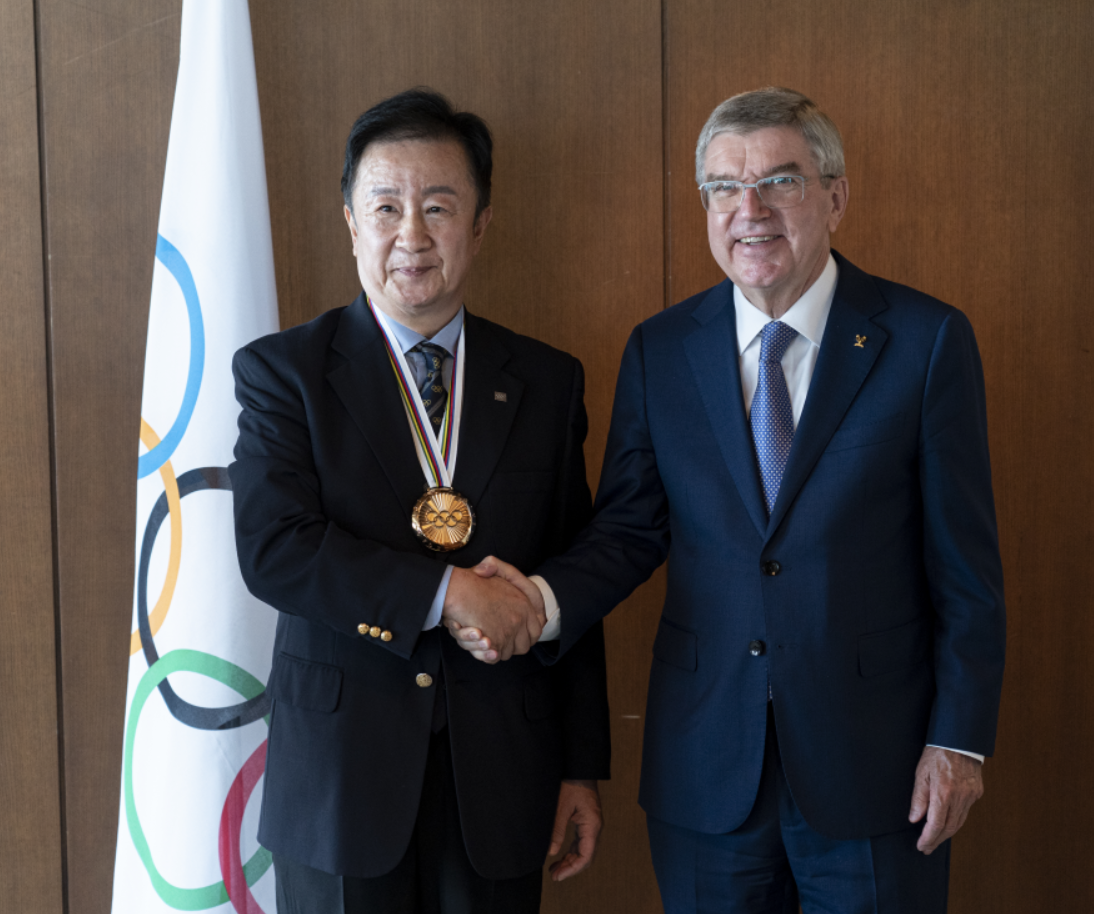[The 9th IOC President Dr. Thomas Bach’s 10-Year Long Leadership (so far) & Contribution together with Highlights of his Famous Analects and Speeches (2013-2023)]
아래 글은 Thomas Bach 제9대 IOC위원장(2013~2025)의 10년 간의 리더십 공헌과 기여 발자취와 더불어 그분이 창출해 낸 그분 만의 둑특한 어휘와 어록 그분의 탁월한 스포츠외교력의 발판이된 여러가지 케이스를 특집 형태로 종합 편집하여 Thomas Bach IOC위원장 본인에게 보낸 내용입니다.
그분은 평창2018동계올림픽 및 패럴림픽의 안전하고 성공적인 개최를 위하여 남북한을 오가는 셔틀 외교를 통하여 북한의 참가와 남북한 서울-평양 2032올림픽 공동유치의 근간을 마련해 주기 위해 애쓰신 세계스포츠대통령입니다.
IOC나 대한체육회(KSOC)에 아무런 직위도 없는 필자에게 IOC집행위원회 결정을 통해 2022년 10월 21일 ANOC서울총회 말미에 필자의 40년 간 올림픽운동에서의 헌신과 섬김을 인정하여 스포츠부문 Nobel Prize로 불리기도 하는 IOC쿠베르탱 메달을 공식 행사를 통해 한국인 중 최초로 직접 전수해 주신 고마운 그분의 10년간의 업적을 기리기 위해 아래 글을 그분에게 헌정하였습니다.
물론 그의 IOC위원장 임기는 현재로서는 2025년까지이지만 지난 10월 인도 Mumbai개최 IOC총회에서 몇 몇 IOC위원들이 Bach IOC위원장 임기를 정식으로 제안하였기 때문에 내년 Paris2024올림픽 개최식 전에 열리는 IOC총회에서 정식 안건으로 상정될 경우 최소 4년 임기가 연장될 개연성도 상존하고 있는 상황입니다.
"The 9th IOC President Thomas Bach is often characterized by his simple but long-lasting magic words penetrating and appealing to the global sport people, especially in the Olympic Movement.
Even myself have continuously been intrigued and touched by his pithy epigram that stings the people to the quick even into our heart and memory.
As for me personally, the most universal and touching word is “Unity in Diversity”, followed by many others, including but not limited to “There is no one-size-fits-all solution”, “without losing political neutrality”, “Olympic legacy for sustainability, flexibility, practicality, good governance, gender equality, “Unifying Power of sport and Olympics to bring together people”, exquisitely melted in his brain child masterpiece, “Olympic Agenda 2020+5”, which is a “Strategic Roadmap of the Future Olympic Movement” and updated Olympic motto of “Faster, Higher, Strong, Together” in the IOC’s 130-year long history as of 23 June 2024 since its creation in 1894.
Dr. Thomas Bach as unprecedented performing designer and strategist of the destiny of the future Olympic Movement, more importantly for me, is one of my three most respected IOC Presidents along with the 2nd IOC President Baron Pierre de Coubertin, IOC Founder and Renovator of the modern Olympic Games and I was also awarded the IOC Pierre de Coubertin Medal in October 2022 and the 7th IOC President Juan Antonio Samaranch who saved the Olympic Movement from several attempts of Olympic boycott, especially Seoul 1988 Games.

My very first personal gift for him was a 4-line poem presented at the time his visit to Gangneung City for his honorary citizenship in mid-March 2018, during which he named it as an “Olympic City”, actually Ice sports venue city of the PyeongChang2018 Winter Games.
The second and third versions of my 4-line poems dedicated to him were also presented in honor of and with my highest respect to his century-long global contribution to the successful organization of the PyeongChang2018 Winter Olympic Games, which is still remembered as “Peace Olympics” thanks to his unique and unprecedented diplomatic skills and leadership between two Koreas through the Olympic bridges. No one will dispute the fact that he well-deserves the Nobel Peace Prize recipient at an appropriate timing in the very near future, I believe."


(IOC President’s First Gift for me after Signing Ceremony of MOU Between Olympic Museum and Gangneung Olympic Musuem, Lausanne/April 2018)
1. IOC President’s Key-Handover Ceremony from the late Jacques Rogge, the 8the IOC President

1) “Many thanks for this symbolic act of handing over the key, which is now a traditional part of IOC history. We both know very well that this handover includes the challenge of taking on the huge demands and responsibility of this office.”
2) “You(Rogge) have left the Olympic Movement a solid foundation and you have every reason to be proud of your great achievement, which has benefited sport worldwide. Here, this evening, we would like to express to you our gratitude, recognition and respect.”
2. From his Acceptance Speech of the Election of the 9th IOC President in the 125th IOC Session in Buenos Aires on 10 September 2013
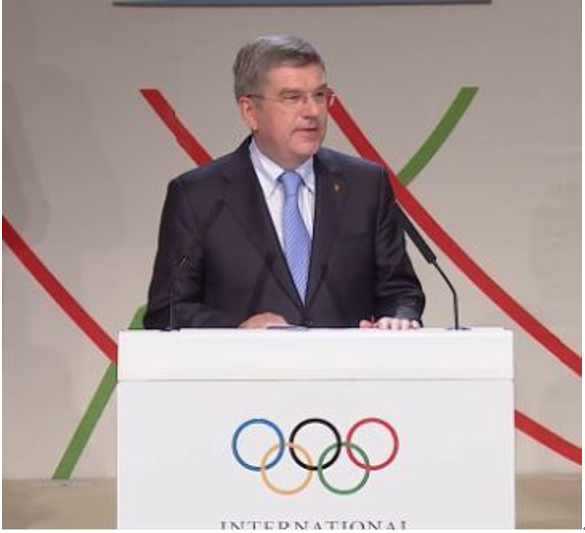
1) “First of all, I would like to thank from the bottom of my heart all my dear friends and colleagues who voted for me this morning.
2)This is really an overwhelming sign of trust and confidence.
3) But I would also like to thank my fellow candidates, who I greatly respect, and all those who did not vote for me this time.
4) I will also work for and with you in the coming years and want to win your confidence, too.”
5) “I know about the great responsibility of an IOC President."
6) “This makes me humble.
7) “I want to lead the IOC according to my motto”: ‘Unity in Diversity.’
8) “I want to be a President for all of you.”
9) “This means I will do my very best to balance well all the different interests of the stakeholders of the Olympic Movement.”
10)“This is why I want to listen to you and to enter into an ongoing dialogue with all of you.”
11)“You should know that my door, my ears, and my heart are always open for you.”
(Bach’s manifesto states he wants to keep the Olympic Games “unique” and not “diluted by other events,” while ensuring the awarding of the Games is based on “the interest of the IOC in an in-depth review and risk analysis of a bid on the one hand, and the interest of a potential bidder in a social and promotional return on investment in the other.”)
3. At his term as President of the IOC has passed its 10-year anniversary, we can now recognize “Thomas Bach’s Ten Commandments” for the Olympic Movement (Ref.: The Sports Examiner)
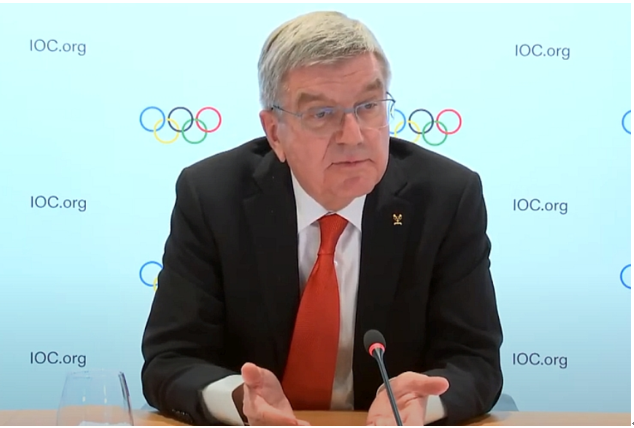
1) Bidding for Olympic Games should not create losers, who waste millions for absolutely no return.
(The IOC now selects its hosts through a mostly-private discussion process.)
2) An Olympic Games must conform to the city, region or country where it is held, and not require unnecessary expenditures.
3) It is considered best if no new venues or permanent constructions are undertaken for a Games, unless as part of an otherwise useful local development plan.
4) Sport must go to where the people are, not require people to come to it.
(This was successfully demonstrated at the 2018 Youth Olympic Games in Buenos Aires at the free, open-air opening ceremony at the iconic Obelisk, and transferred to Paris 2024 with its opening on the Seine.)
5) Sport must appeal to youth, or in Olympic-speak, “be more urban” and “youth-oriented.”
(Thus the inclusion to the permanent program of skateboarding, sport climbing and surfing from 2028 and the IOC moving toward its own “e-sport Olympics.)
6) Sport governance through the “solidarity model,” in which money is distributed through National Olympic Committees for development projects and athlete support, rather than simply paying athletes directly through prize money.
7) Strict requirements for gender equality in terms of the number of men’s and women’s athletes competing, which will be reached at Paris 2024.
8) Strenuous anti-doping measures, preferably handled by an independent agency; the IOC created the International testing Agency in 2018, which has quickly absorbed most of the anti-doping programming for Olympic-sport federations.
9) Athletes are not responsible for the actions of their government, so long as they are not affiliated with their government.
10) The IOC should respect, follow and implement the directives and regulations of the United Nations.
4. My Personal & Thankful Communications Opportunities with IOC President Thomas Bach for a SDGs-Oriented Olympic Movement in the Future
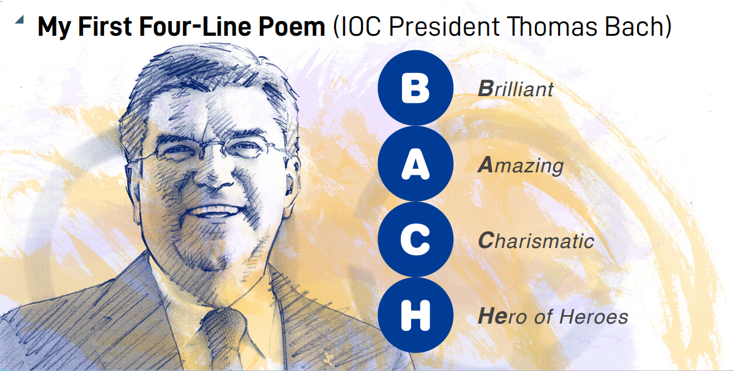
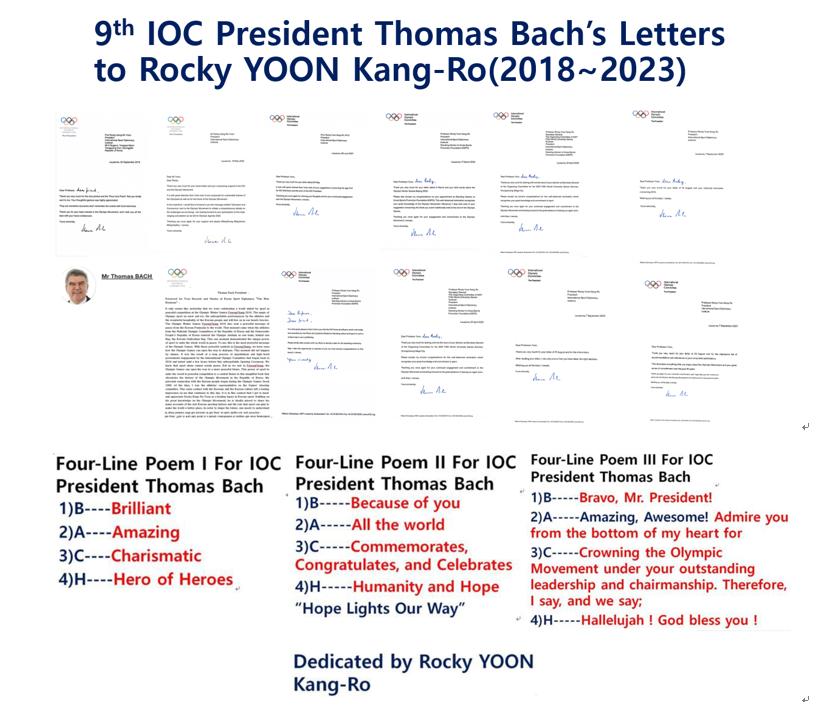
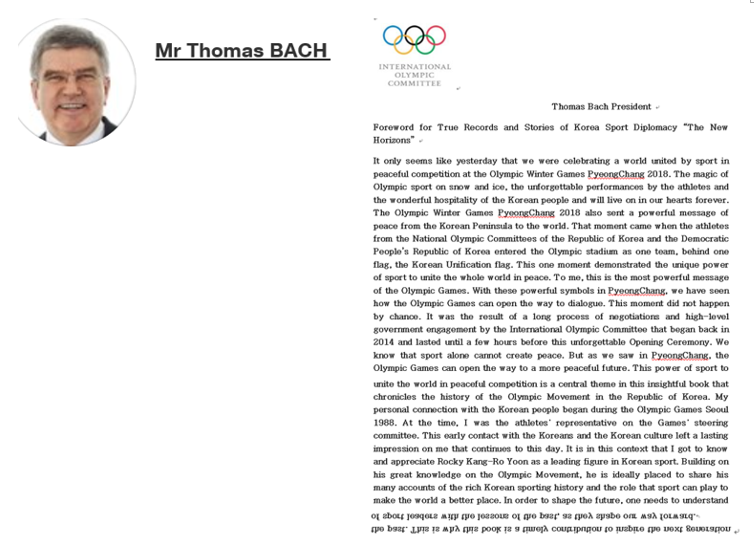
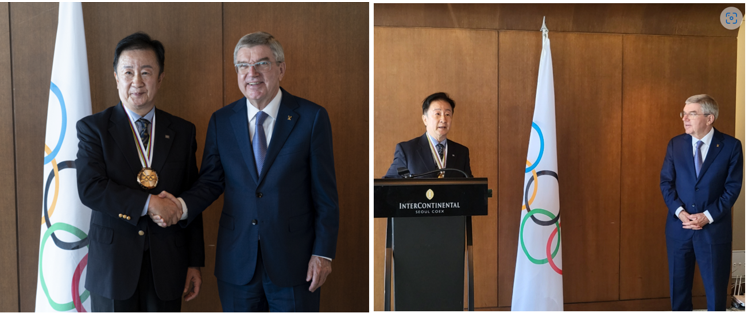
(IOC Pierre de Coubertin Medal Presentation to Rocky YOON by IOC President Thomas Bach 21 October 2022, Seoul)
5. Presentation of the Pierre de Coubertin Medal to Rocky Yoon Kang-Ro by IOC President Thomas Bach /Seoul, October 2022
“It is with great pleasure to inform you that the IOC Executive Board, which met today, has decided to award you the Pierre de Coubertin Medal for blending culture and sport in such a unique way in your publishing” (Letter by IOC President Thomas Bach about the decision by IOC Executive Board dated 9 September)
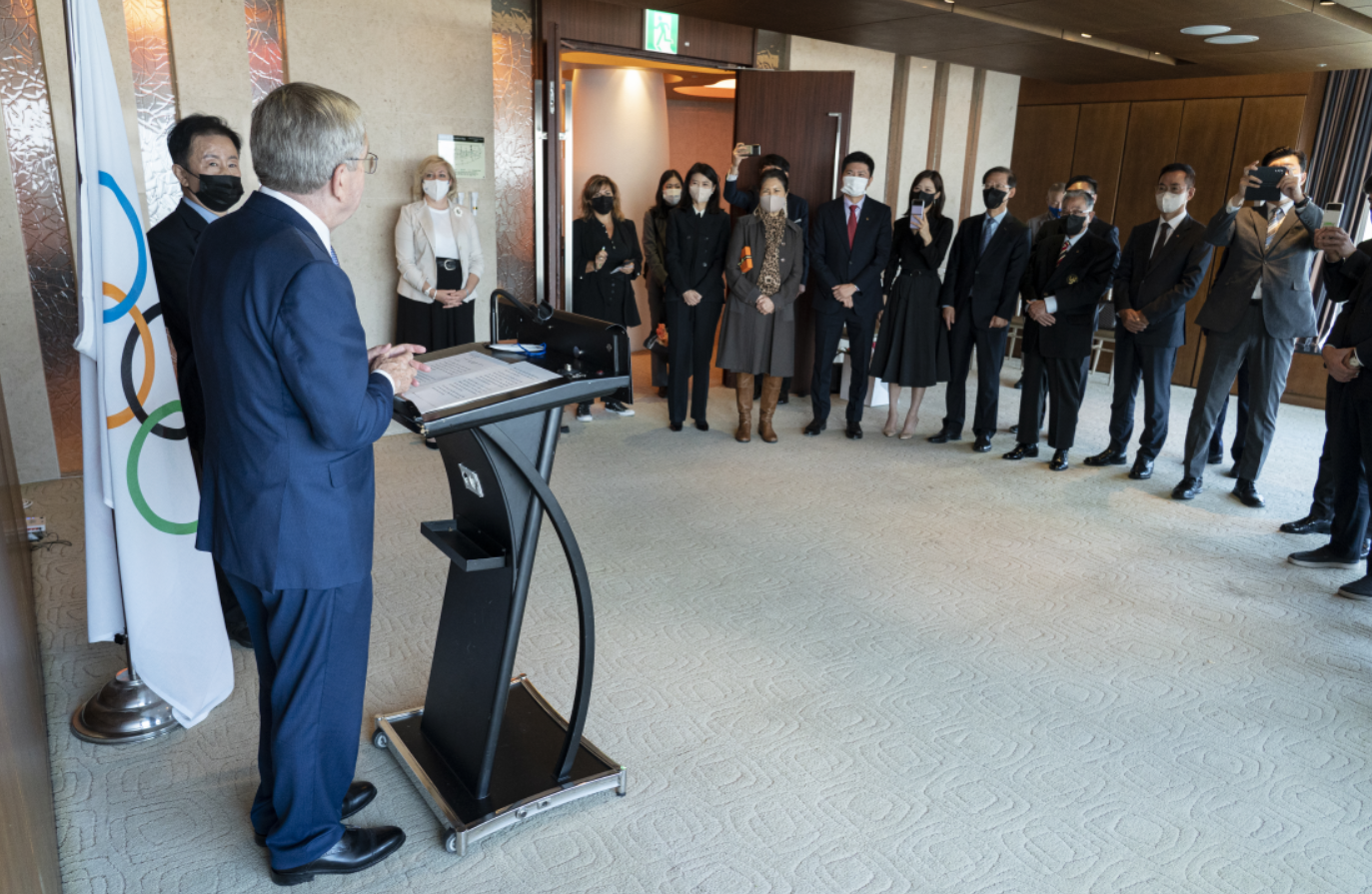
Dear friends,
For our founder, Pierre de Coubertin, the Olympic Games were always much more than just a sporting event. He wanted to make the world a better place through sport and its values. This remains the overarching mission of the IOC and the entire Olympic Movement to this day.
Dear Rocky,
Having known you for such a long time, I can say from personal observation that during all these many years, your commitment to the Olympic Movement has always been a reflection of this vision of our founder.
Making the world a better and more peaceful place through sport has always been your guiding principle throughout your illustrious career.
At the Korean Olympic Committee, as the Korean Sport and Olympic Committee was formerly known, you were deeply involved in the successful organisation of the Olympic Games Seoul 1988. These Games left a remarkable sporting legacy to the people of Seoul and the Republic of Korea.
My personal connection to Seoul and Korea also began during these Games. At the time, I was the athletes' representative on the Games' steering committee. Ever since then, Seoul and its people have a very special place in my heart.
After the closing of the Olympic Games Seoul 1988, promoting the legacy of these Games has been the guiding theme of your career. As Standing Advisor to the Korea Sports Promotion Foundation, you have taken part in long-term projects including the Seoul Olympic Legacy Forum, which is taking place this week right here in Seoul.
You spent more than two decades as an official delegate for the NOC of the Republic of Korea, serving the development of sport and spreading the Olympic values throughout the country. During this time, your outstanding dedication to the athletes is reflected in the fact that you were a leading member of the South Korean delegation for an incredible ten editions of the Olympic Games.
Over the years, you have always shown a desire to share and pass on your extensive Olympic experience. Most recently you did so by providing guidance and counsel to the Organising Committee of the Olympic Winter Games PyeongChang 2018 in your capacity as senior advisor to the OCOG President. I am very grateful to say that the IOC, through its Evaluation Commission for the Olympic Games Beijing 2008, has also benefited your deep expertise.
Your belief in the power of sport has also guided you in your current role as President of the International Sport Diplomacy Institute. In this capacity, you are continuing to keep the legacy of Seoul 1988 alive, in particular through your active engagement with young people. With your lectures at renowned universities, you are inspiring the new generation with our shared Olympic values.
Perhaps nothing illustrates your passion for sport better than the creation of the Pyeongsan Sports Museum close to your home town, where thousands of Olympic artifacts and memorabilia are on display, many from your private collection.
Having just recently published the book “True Record and Stories of Korea Sports Diplomacy” you show no signs of slowing down. On the contrary, your unwavering commitment and enthusiasm for the Olympic Games continues to reach new heights. This is why today, we salute and honour your unique contribution and deep-rooted attachment to the Olympic values.
Dear Mr. Yoon Kang-Ro, dear Rocky,
In recognition of your outstanding achievements in supporting the cause of world sport and your faithfulness to the Olympic ideal as illustrated by Pierre de Coubertin, reviver of the Olympic Games, it is an honour and pleasure to present you with the Pierre de Coubertin Medal.
*Rocky YOON’s Thank-you Note to IOC President Thomas Bach at the IOC Pierre de Coubertin Medal Awarding Ceremony (Seoul, 21 Oct. 2023)
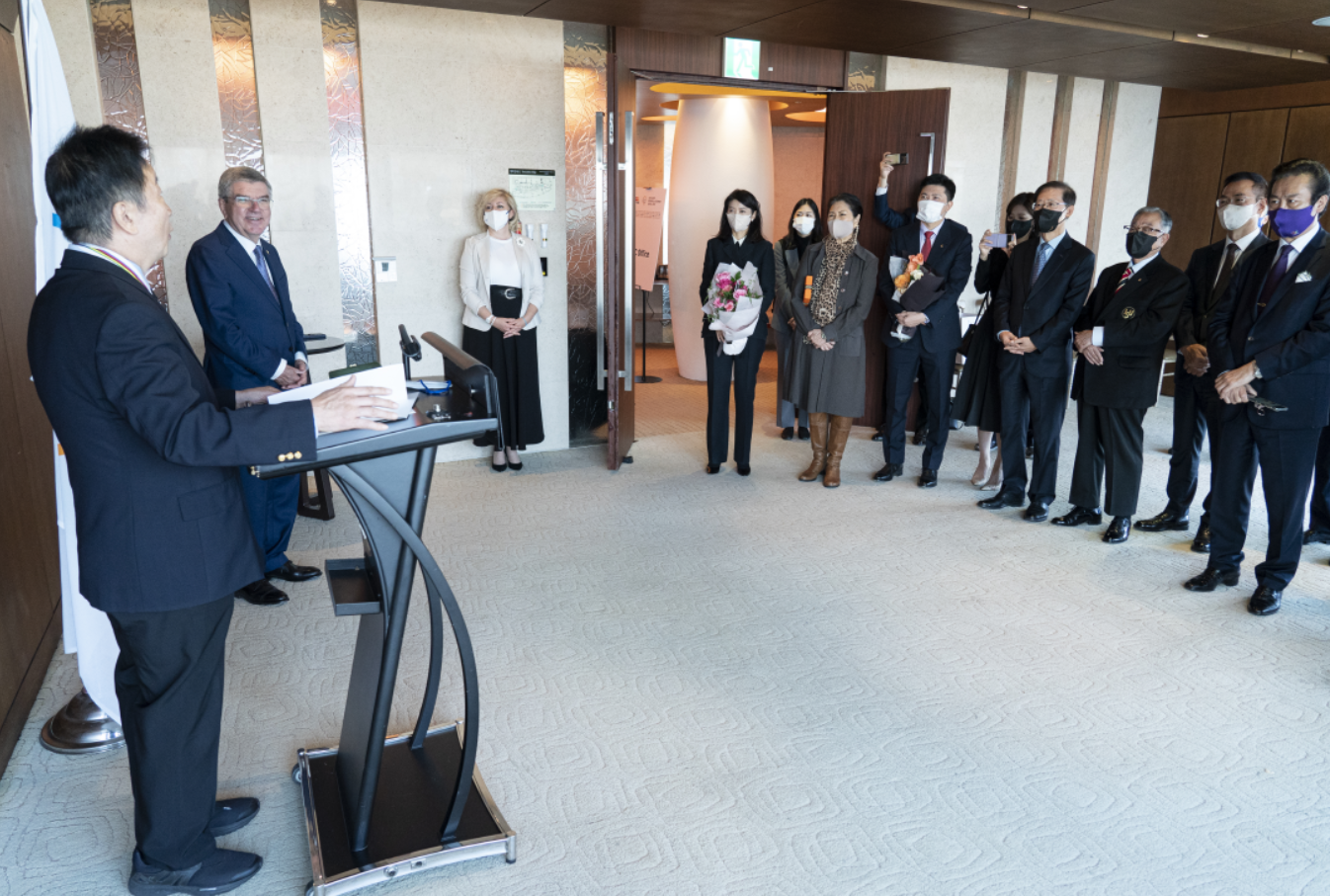
Honorable IOC President, Dr. Thomas Bach,
Distinguished guests who are present here today to attend the Awarding Ceremony of this prestigious Baron Pierre de Coubertin Medal out of busy schedule.
Very good morning!
First and foremost, I am deeply touched and grateful to IOC President Thomas Bach who is sharing this space with us at this present time and made this possible at the IOC EB held on 9 September for his generous and insightful decision and consideration to award to me the Coubertin Medal.
When I receive his letter, I couldn’t believe my eyes, but soon I realize that this is really happening to me.
I am very much excited, tremendously honored, incredibly privileged, and enormously and immeasurably pleased not only to become a recipient of this medal but also to receive it at first hand from IOC President Thomas Bach who has come a long way for this ceremony as well, on the auspicious occasion of the first Seoul Olympic Legacy Forum as a key-note speaker, which ended yesterday.
This medal is so important in giving me a sense of encouragement and motivation and inspiration to move forward together to build a better society concerned with the preservation of human dignity during the rest of my life.
Blending sport with culture and education, Olympism seeks to create a way of life based on the joy, found in efforts and educational value of good example based on the universal, fundamental and ethical principles.
No one will dispute the fact that IOC President Thomas Bach is by far the greatest global leader in the 21st century Olympic Movement with vision, wisdom, ability and inspiration to upgrade and re-design the modern Olympic Movement with his brain child masterpiece, Olympic Agenda 2020+5, ensuring and realizing transparency, sustainability, good governance, cost-effectiveness, best possible efficiency of the Olympic Games as well as equal and balanced opportunities in a spirit of the Olympic values of Excellence, Friendship and Respect.
Coubertin was a pioneer and forefather with a crystal clear vision for the initial Olympic Movement above and beyond time and space toward universality and sportsmanship with values of Olympic motto of Faster, Higher, Stronger, and recently strengthened with one simple but very meaningful and unifying word “Together” by IOC President Thomas Bach. Baron Pierre de Coubertin devised and designed Best Optimized Olympic Concept and vision suggesting to revitalize human values from teenagers, youth to produce a better and more peaceful world through sport.
In full alignment of the vision of Baron Pierre de Coubertin and the Olympic Agenda 2020+5, President Bach’s vision is well reflected and echoed in his connotative and implicative words of “Unity in Diversity”, Unifying Power of Sport and Olympics to bring together people, cultures, ideas, and lifestyles over Five Rings around the world. I would like to define it as a new revolution of the modern Olympic Movement in order to discharge prejudice and discrimination of any kind.
On each and every occasion of his speech, IOC President Thomas Bach impressed the world with his own expressions, such as “There is no one-size-fit-all solution”, “This world is run by politics and not by sports organizations” as a reason why sport stay on neutrality, to say the least.
In order to eliminate mal practices, danger and risk factors of the past Olympic Host City selection process, he reformed it and created the new age Olympic Host selection system by creating “FHC” system, thereby enabling IOC to choose best optimized Olympic Host Cities “whenever timing is right”. I think he must be an Olympic genius and here of heroes in the 21st century Olympic Movement.
During the 128 years of the Olympic Movement, in my judgment, I can say there have been three most outstanding and greatest IOC Presidents, Firstly, Baron Pierre de Coubertin who served 21 years. Secondly, Juan Antonio Samaranch who also served 21 years. Thirdly and most importantly for the vast majority of the global stakeholders, I believe, the current IOC President Thomas Bach who has served 9 years so far and will serve only 3 more years, but I believe his term should be extended likewise in accordance with his achievements and role to play in order to overcome on-going and rapidly approaching crisis facing the global Olympic Movement including but not limited to pandemics.
Once again, I would like to reiterate my profound gratitude to IOC President Thomas Bach for his generous and insightful decision awarding this prestigious Pierre de Coubertin Medal to me in person. Thank you for your attention. And may God bless you and the Olympic Movement.
6. Quotations (76) from IOC President Thomas Bach’s Speech at the 130th Extraordinary IOC Session in Lausanne on 11 July 2017
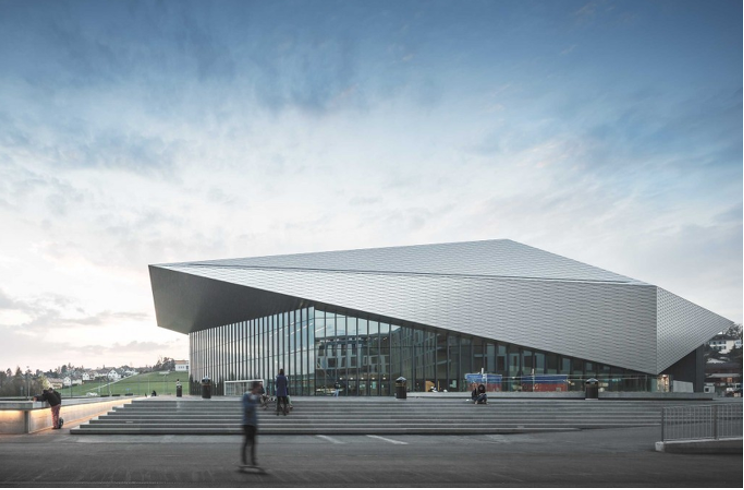
“Charge boldly through the clouds and do not be afraid. The future belongs to you.”
“Let us show that sport is also always about ambition and optimism
“Let us not rest on our current position of strength.”
“Let us make sure that we can enjoy such stability also in the years to come”
1) “A warm welcome to all of you to this extraordinary IOC Session.”
2) “It is an extraordinary meeting because we are at an important juncture for the Olympic Movement.”
3) “Our discussions and decisions today will chart the course of the Olympic Games for the foreseeable future.”
4) “We will be discussing two separate but related decisions.”
5) “Both will affect the future of the Olympic Games in profound ways.”
6) “In this respect, now is a moment to shape the future of our Movement. “
7) “This is why I am looking forward to an interesting debate today.”
8) “We can have this discussion from a position of strength and stability.”
9) “You will see this when the audited accounts will be presented and we can hopefully approve the financial figures.”
10) “This gives us the opportunity to once more look at our governance structures.”
11) “The financial figures are not only audited by our external auditors, but they are also always closely monitored by our Audit Committee and our Internal Auditor.”
12) “Let me thank the members of our Audit Committee under the great leadership of its Chair, Pierre-Olivier Beckers-Vieujant, for their hard work and good advice they are giving us on this matter throughout the year.”
13) “This Audit Committee is of course further supported by the Finance Commission who again monitor the financial flows and operations of the IOC.”
14) “Let me also acknowledge and thank all its members and its Chair, Ser Miang Ng, for their valuable contribution.”
15) “The financial figures take into account the record amount that we have distributed to Rio 2016. ”
16) “We have made a tremendous effort, together with the IFs and NOCs, with additional financial contributions and savings at the same time, to make the first Olympic Games in South America a reality, despite all the unprecedented challenges of our Brazilian friends.”
17) “As you approve the audited accounts, I hope you take all this into consideration.”
18) “Following the approval, we can then proceed to publish the Annual Report.”
19) “As always, the Annual Report will provide an in-depth account of our activities, making all the IOC’s financial flows fully transparent and demonstrating that we are distributing 90 per cent of all our revenues for the development of sport worldwide.”
20) “This very high percentage of redistribution to support world sport is something that we can be very proud of.”
21) “Our strong and stable financial situation allows us to focus almost all our energy on the overarching mission of the IOC, to make the world a better place through sport.”
22) “This is the solid foundation that we can build on for our future.”
23) “This strong position of the Olympic Movement is also demonstrated by a great opportunity that we will discuss today.”
24) “This is about awarding the Olympic Games 2024 and 2028 at the same time in Lima this September.”
25) “As you have seen and heard this morning, and as confirmed by the report of our Evaluation Commission, we have two outstanding candidatures for 2024.”
26) “With Los Angeles and Paris, there are two fantastic cities from countries with a profound Olympic history.”
27) “The two candidate cities are enthusiastic and dynamic.”
28) “They are promoting the Olympic Games and the Olympic spirit in a great way.”
29) “The Candidate Cities for the Olympic Games 2024 are the first to fully benefit from the significant changes that resulted from Olympic Agenda 2020.”
30) “The Evaluation Commission has come back with praise for both candidatures.”
31) “Both cities have really embraced Olympic Agenda 2020, in particular by using a record number of existing and temporary facilities.”
32) “This is something we have not seen in this dimension in the history of the Olympic Games.”
33) “Such proposals lead to significant cost reductions in the organization of the Olympic Games.”
34) “This sets a precedent to make the Games more sustainable and more feasible for the future.”
35) “It is exactly this spirit of Olympic Agenda 2020 that we are promoting.”
36) “As you can see, this is a golden opportunity.”
37) “It is hard to imagine something better.”
38) “This is why the Executive Board asked the IOC Vice-Presidents to study how the Olympic Movement could make the most of this unique constellation.”
39) “The Executive Board is unanimously supporting their recommendation not to miss this golden opportunity.”
40) “The Vice-Presidents will give you even more reasons why this double allocation should happen and how we can make it happen.”
41) “We can create a win-win-win situation for the entire Olympic Movement, for Los Angeles and the United States of America, and for Paris and France.”
42) “While the allocation the Olympic Games 2024 and 2028 at the same time is about seizing an opportunity, the next decision is about addressing a challenge.”
43) “This decision is about reforming our current candidature procedure with a view to the Olympic Winter Games 2026.”
44) “The challenges that we face here are both external and internal.”
45) “Firstly, there is a profound change in the decision-making process in many Western countries.”
46) “In the past, when we saw that a candidature enjoyed the support of the government, of the opposition, of business and of the sport community, then we were sure that the candidature had broad public support.”
47) “This has changed dramatically, in particular in Europe.”
48) “Today, when people see that the government, the opposition, business and the sport community, in other words, when the entire establishment is united behind one project, then the people immediately have mistrust and conclude that something must be terribly wrong.”
49) “In many countries, populist movements are on the rise.”
50) “As we have seen in the recent past, these populist movements can be very effective, even if they might still be too small to run a government.”
51) “But they have a strong influence over policy and political decision making.”
52) “The New York Times described this quite well recently when they wrote:
53) “Western populism may be entering something like its awkward teenage years – able to borrow the car but not own it, have an influence on the household but too young to run it.”
54) “We may not like this new political reality, but we cannot ignore it. “
55) “This is the external challenge.”
56) “But we have to acknowledge that internally, with our candidature procedure, we have given some arguments to this public scepticism and mistrust.”
57) “In a nutshell, the candidature procedure, which worked very well in the past, has become too expensive and too onerous for some potential candidate cities today.”
58) “We have been asking too much too soon from the candidate cities.”
59) “For all these reasons, it is extremely difficult for sport and government authorities in many countries today to come back with a second candidature, when a first one was not successful.”
60) “In particular, this is limiting the number of potential candidates for Olympic Winter Games, where for geographic reasons, but increasingly also because of climate change, we had and continue to have a much smaller number of potential candidate cities.”
61) “Because of the fact that the Olympic Winter Games 2014, 2018 and 2022 are all held in completely new winter sport destinations, there is a public perception that this trend will continue.”
62) “It is therefore in our best interest to demonstrate that traditional winter sport destinations in the Americas, Europe or Asia are most welcome as Olympic hosts.”
63) “The world is changing at an ever-faster pace.”
64) “It has changed in profound ways even in the time since we passed Olympic Agenda 2020.”
65) “It has changed in profound ways even in the last few months, even in the last weeks and days.”
66) “We need to continue to address this change.”
67) “The Vice-Presidents will share the details of the proposal, unanimously supported by the Executive Board, for a new approach for the Olympic Winter Games 2026.”
68) “As you can see, these two decisions before us will have far-reaching implications for the future of the Olympic Games.”
69) “One is an opportunity, the other one a challenge.”
70) “Both are an occasion to remind ourselves of our founder, Pierre de Coubertin who once said:
71) “Charge boldly through the clouds and do not be afraid. The future belongs to you.”
72) “Let us take courage from his words.”
73) “Let us show that sport is also always about ambition and optimism.”
74) “Let us not rest on our current position of strength.”
75) “Let us make sure that we can enjoy such stability also in the years to come.”
76) “In this spirit of ambition and optimism, I wish us all fruitful discussions and a successful Extraordinary Session.”
7. IOC President Thomas Bach’s Secret of the Success of the PyeongChang2018 Winter Games
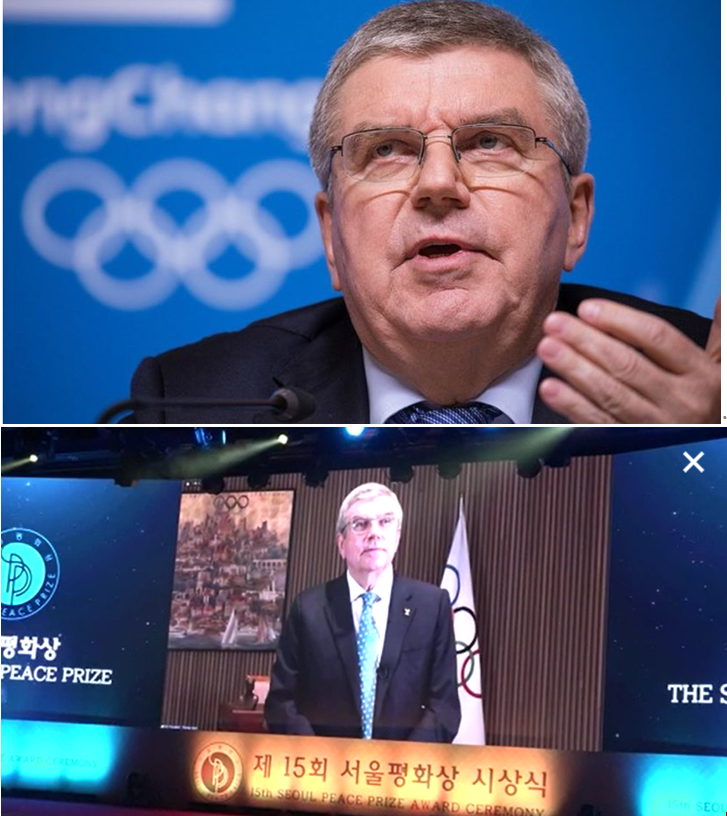
(IOC President Thomas Bach and his Awarding of Seoul Peace Prize 2021)
1) “The secret of PyeongChang2018’s success in encouraging North Korean participation was due to political neutrality.”
2) “It would be “naïve" and "unrealistic" to believe the Olympic Games can ignore wider political developments.”
3) “It would only be possible to be able to this while remaining strictly neural.”
4) “This world is run by politics and not by sports organizations.”
5) “Therefore, to preserve the autonomy, we have to have a partnership and mutual respect.”
6) “On the one hand, our respect for the priorities of politics, and on the other hand, their respect of the politics for the autonomy of the IOC, making them aware that we can only accomplish our mission if we have this autonomy, if we are politically strictly neutral.”
7) “And what this means, you can see from the Korean issues.”
8) “If we would not have been strictly politically neutral, we could never have achieved the joint march behind the one flag nor the joint women's ice hockey team.”
8. IOC President Bach’s writing to Olympic Movement: Olympism and Corona (29 April 2020)
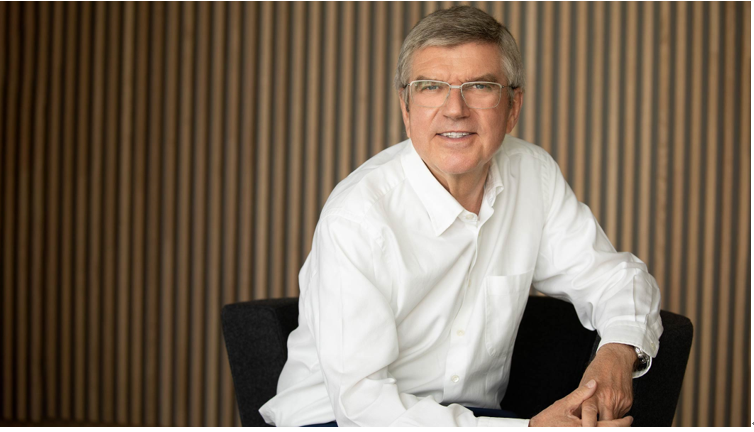
OLYMPISM AND CORONA
With the global COVID-19 pandemic, we are all living in much uncertainty. At this point in time, this uncertainty is far from subsiding. We are all only beginning to understand the far-reaching consequences of the coronavirus crisis around the world. What is certain, however, is that this pandemic has affected and will affect all areas of society, including all of us in the world of sport, significantly. The global spread of the virus has meant that the Olympic Games Tokyo 2020 have had to be postponed to 2021, a historic decision that was taken in order to safeguard the health of the athletes and the hundreds of thousands of people involved in the Games. In this respect, please accept my sincere thanks and appreciation to each and every one of you for your strong support of the decision by the IOC Executive Board to postpone the Olympic Games Tokyo 2020, which we took together with our Japanese partners and friends. Given the difficult circumstances we are all currently facing, the very broad and overarching support for this decision was not a foregone conclusion. This is why the support of all 206 National Olympic Committees (NOCs), all Summer Olympic International Federations (IFs) plus the IOC Athletes’ Commission and the continental athletes’ commissions for this historic postponement is a great demonstration of the unity of the Olympic Movement under these unprecedented circumstances.
1) Coronavirus crisis management
Now we have another unprecedented challenge ahead of us – organising the postponed Olympic Games. This is a first in our long Olympic history, and it is an immense task for the IOC, our Japanese partners and friends, and all the members of our Olympic community. This new situation will need all our solidarity, creativity, determination and flexibility. We shall all need to make sacrifices and compromises. Extraordinary circumstances call for extraordinary measures. This situation requires every one of us to do our part, and this applies to all of us, including the IOC. For our part, we have made it clear that the IOC will continue to be responsible for its share of the operational burden and its share of the costs for these postponed Games, under the terms of the existing agreement for 2020 that we have with our Japanese partners and friends. Although it is too early to give an exact figure, we already know that we have to shoulder several hundred million US dollars of postponement costs. This is why we also need to look into and review all the services that we provide for these postponed Games. With regard to supporting the Olympic community that is affected by this crisis, we are already in fruitful discussions with the athletes, the NOCs and the IFs, as well as our commercial partners and sponsors. As immediate measures, we have already extended all Olympic grants to the NOCs to cover their preparations for the Games. This also applies to the grants for 1,600 Olympic Scholarship athletes worldwide and the IOC Refugee Team. The joint Task Force with the symbolic name “Here we Go” is already working at full speed in a highly professional way. It has established the priorities and management strategies to make these postponed Olympic Games feasible and successful. These priorities include first of all to create a safe environment with regard to health for all participants. Here, we can continue to rely on the advice of the World Health Organisation (WHO) concerning potential adaptations to the organisation of mass gatherings. With regard to feasibility, the IOC has provided a wide-ranging catalogue of cost-saving measures to the joint Task Force. By following this strategy, we have the unique opportunity to turn the celebration of the postponed Olympic Games Tokyo 2020 into a festival of unity for humankind, and a symbol of human resilience to overcome this coronavirus crisis. Imagine what a powerful signal of hope these Olympic Games will be for the world during these unprecedented times. The Olympic flame can be the light at the end of the dark tunnel that humankind currently finds itself in.
2) The post-coronavirus world
At this moment, nobody knows what the realities of the post-coronavirus world will look like. What is clear, however, is that probably none of us will be able to sustain every single initiative or event that we were planning before this crisis hit. We will all need to take a close look at the scope of some of our activities and make the necessary adjustments to the new realities. In this context, the IOC administration is reviewing the IOC’s budget and priorities. This review will shortly be presented to the IOC Executive Board for discussion and approval. The motto when we launched Olympic Agenda 2020, and which is written on the wall at Olympic House: “Change or be changed”, is in this crisis-time more relevant than ever. As challenging and difficult as the circumstances may appear right now, if we draw the right lessons from the current situation, we can shape our future to even strengthen the relevance of our Olympic Movement in the world. Therefore, we should drive further the reforms of Olympic Agenda 2020, in particular with regard to sustainability, in order to address this crisis. To accomplish this, as a responsible organization we should dare to look into the future of the world after this crisis. History tells us that significant crises or systemic shocks, like the coronavirus pandemic, have profound and far-reaching impacts on society at large. Therefore, we have to imagine in what kind of post-coronavirus world sport, the Olympic values and the Olympic Games will find themselves in. At this moment in time, nobody can truly predict the realities of this post-coronavirus world. But if we want to be prepared, we need to try to look further ahead. To this discussion I would like to contribute some food for thought: One could imagine three broad scenarios, while bearing in mind that these are by no means exhaustive, nor likely to become reality in their pure form, but will differ according to their national, regional and cultural background. In the first scenario, society will try to continue much like before the crisis. With this scenario, the current crisis would most likely exacerbate already existing social and economic inequalities. Too many inequalities and inefficiencies in too many societies have been laid bare in this crisis. The world will not be able to overcome these by blindly following computer algorithms based on data stemming from the past, like from the financial crisis in 2008. This crisis is very different. To overcome this crisis will require human excellence, experience and creativity. The second scenario is largely characterized by society and nations driven even more by egoism and self-interest. This scenario could lead to even more divided societies, to more inequalities, with all the social risks this entails for the political systems. It would lead to a dramatic worsening of international relations, protectionism and political confrontation in all aspects of human life: the economy, sport, culture, humanitarian aid, everything would become a political tool in this political confrontation. The main features of the third scenario are more solidarity and international cooperation. This scenario would mean that we have understood that we cannot predict or shape the future state of the world by relying solely on technology, and that no individual, no government, no nation can solve the big problems of humanity on their own. This would lead to efforts to share the hardship of the crisis in a fair way among people and nations, and to strengthen a fair and cooperative world order. Whichever elements of these scenarios are dominant, there will be a fundamental effect on sport and society at large. Being united by our Olympic values of peace, solidarity, respect and unity in all our diversity, we can make an important contribution to this post-coronavirus world. We can do so from a strong basis. Thanks to the many reforms of Olympic Agenda 2020 we are enjoying long-term stability. This allows us to shoulder not only our share of the postponement costs of the Olympic Games Tokyo 2020 but at the same time keep assisting the athletes and the Olympic stakeholders. Yet there is no reason to be complacent. This post-coronavirus world will confront us with more challenges, in particular social, economic and political ones. Therefore, we have to drive Olympic Agenda 2020 forward and adapt it.
3) Social impact
We can fairly assume that, in the post-coronavirus society, public health will play a much more important role. Sport and physical activity make a great contribution to health. While studies by the WHO had already demonstrated this with stunning results concerning non-communicable diseases, the coronavirus crisis teaches us how much a sound general health situation helps to overcome communicable diseases as well. Sport and physical activity are therefore the perhaps most low-cost tool for a healthy society. To make this even more evident too, the IOC is about to conclude a new Memorandum of Understanding with the WHO. We can highlight the significance of sport for inclusivity and integration. Sometimes, sport is the only activity that unites people regardless of their social, political, religious or cultural background. Sport is the glue bonding a society together. Such inclusivity is even more important in otherwise deeply divided societies. We shall also have to consider what social distancing may mean for our relations with e-sports. Whilst maintaining our principles by respecting the “red line” with regard to the Olympic values, we encourage all our stakeholders even more urgently to “consider how to govern electronic and virtual forms of their sport and explore opportunities with game publishers” (Declaration of the 8th Olympic Summit, 7 December 2019). Some IFs have already been very creative by organizing remote competitions. We should further strengthen these moves and encourage our joint working group to address this new challenge and opportunity.
4) Economic impact
Without any doubt, the current health crisis will lead to a long and deep economic crisis, the effect of which on sport may differ from country to country. This will depend greatly on the importance governments will give to the enormous social capital represented by sport when it comes to the allocation of the financial assistance provided by them for the recovery of economy. Therefore, we should strongly request governments to appreciate and honor the immense contribution of sport to public health, its importance for inclusion, social life and culture, and its important role for their national economies. In Europe, for example, a recent study showed that sport contributes more than two percent to GDP, a contribution which makes sport economically more important than a number of more traditional economic sectors. The same study found that nearly three per cent of all jobs in Europe are sport-related. Sport is therefore a big employer. This study, like many others, demonstrates that sport can play not just a positive social role but also an economic one in helping the world to recover from the crisis. We are not part of the problem. We can be part of the solution. To achieve this, governments must include sport in their economic support programmes. However, for most sports events, as for all sectors of society, things will not be as they were before. This is why the IOC should further strengthen the sustainability and feasibility reforms of Olympic Agenda 2020 with a new phase of the “New Norm” to make even more savings possible for the Organizing Committees of the Olympic Games. These new measures should lead to an even more restricted footprint for all the stakeholders at the Olympic Games. The IOC will also study whether and how we can accelerate our response to climate change. The IOC as an organization is already carbon neutral, as the Olympic Games Tokyo 2020 should also be. Our new aim could be to make them both climate positive even before 2030, which is the year targeted by the international community to achieve their climate goals. For the Olympic Movement as a whole, we may also have to look more closely into the proliferation of sports events, as we already discussed at previous Olympic Summits. The financial pressure on all the stakeholders, including NOCs, IFs and Organizing Committees, may require more consolidation in this respect.
5) Political impact
At least in some parts of the world, we may see more nationalism, more protectionism and, as a result, more political confrontation. Here, our Olympic values of solidarity, peace, respect for each other and for the global rules of sport need to be emphasized. By living in and strengthening solidarity we can show that respectful international cooperation produces better and fairer results than isolationism. We all have to make every effort to ensure that the Olympic Games are supported by the entire international community as the demonstration of the “Unity of humankind in all our diversity”; that the Olympic Games are building bridges for everybody without any kind of discrimination; and that therefore the Olympic Games as this unique sports, cultural and social event should be beyond any political or other divisive considerations.
6) The way forward
I hope that with these ideas I can contribute to a comprehensive discussion. Therefore, I propose a wide-ranging consultation among all of us under the guidance of the IOC Executive Board and the IOC Session, as we did for Olympic Agenda 2020. Already the Ancient Greeks, to whom we owe the Olympic Games, knew that with every crisis comes an opportunity. Let us take this opportunity in a way of unity and creativity to emerge from this crisis even stronger than before. The post-coronavirus world will need sport, and we are ready to contribute to shaping it with our Olympic values.
Lausanne, 29 April 2020
Thomas Bach
9. Strategic Framework on Huma Rights to realize best practices in the selection of future Olympic Games hosts at the IOC Executive Board on 9 September 2022)
1)“This Framework will fundamentally shape the working practices of the IOC, the Olympic Games, and the entire Olympic Movement, ensuring that human rights are respected within our own respective remit”
2) “The overarching mission of the Olympic Movement, as you know, is for sport to contribute to a better world ... It will address selection of future Olympic Games hosts and the delivery of the Olympic Games.”
3) “What is clear ... is the [host city selection] procedure, and there, you can see from this Human Rights Framework that the Future Host Commission, which is leading this process, will be guided by the U.N. [Guiding Principles])”
(1)Equality and non-discrimination
(2) Safety and well-being
(3)Livelihood and decent work
(4)Voice
(5)Privacy
*Four related Goal Targets:
(1)Athletes
(2) IOC/IF/NOC and organizing committee workforce
(3)Workers in supply and value chains
(4)Olympic-related communities
4) “We have, of course, taken note of this report.
5) With regards to the Olympic Winter Games Beijing 2022, which fall within our remit, the IOC worked together with the organizing committee to ensure that all the obligations in the Host City Contract were met, and if you read the report by the U.N. High Commissioner and you look into the recommendations which are directed to the wider society, there is the call, therefore, for respect of the U.N. [Guiding Principles], and this is what we are doing
10. IOC President Thomas Bach’s Position on Russia’s Participation in the Paris 2024 Games (IOC EB in March 2023)
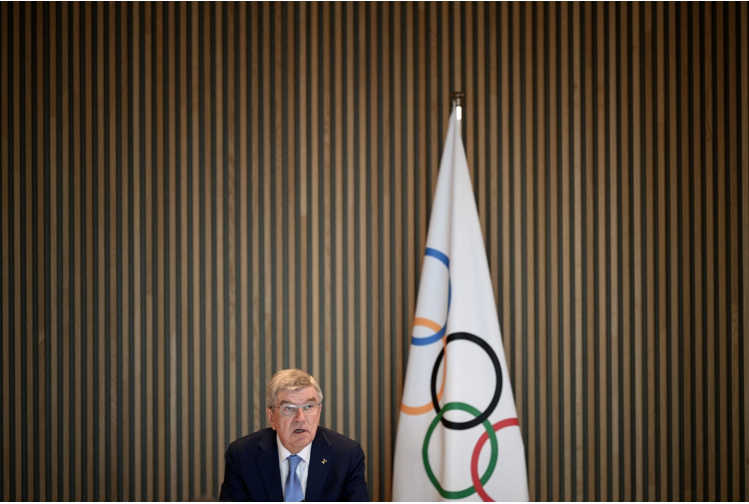
1) “It is deplorable to see that some Governments do not want to respect the majority within the Olympic Movement and all stakeholders, nor the autonomy of sport which they are appraising and requesting from other countries in countless speeches, UN resolutions, European Union declarations and at every other opportunity.”
2) “It is deplorable that these Governments do not address the question of double standards with which we have been confronted in our consultations.”
3) “We have not seen a single comment on their attitude on the participation of athletes whose countries are involved in the other 70 wars and armed conflict in the world.”
4) “It is even more deplorable that they grossly neglect the very clear statement of the two special rapporteurs from the UN Human Rights Council, while in other issues they are always highlighting their firm requests for the respect of human rights.”
5) “That both sides in this confrontation are not satisfied to say it diplomatically might indicate that we found some middle ground on which we all can move forward to make a contribution to understanding and peace through sport”
6) “Today after all the responses we got, I can only reaffirm that the entire Olympic Movement strongly stands by its values and by its mission to unite the world in a peaceful competition.”
11. IOC President Thomas Bach’s Message at Mumbai IOC Session (15 October 2023) about the Petitions by some IOC Members for the Extension of IOC President’s Term of Office
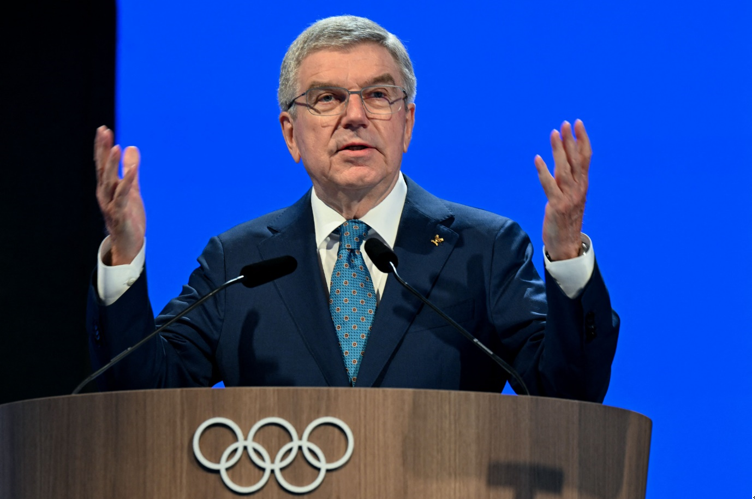
1) “First of all, say thank you very much for your kind words of support, because I think these words of support are not only directed to me, they are directed to all of us”
2) “What made us overcome the challenges we had was exactly this unity, this support which you expressed with regard to many items overall at the time, and we can only be credible if we are appealing to all these divisive forces in the world, if we are appealing to respect the unifying of sport if we ourselves are unified.”
3) “Otherwise, we have no credibility. If we are divided, how can we teach others about unity and our unifying power.”
4) “You also know I am very loyal to the Olympic Charter”
5) “Being a core author of this Olympic Charter drives me to be more loyal to this Olympic Charter.”
6) “You have heard the explanation of the chair of our Legal Commission in this direction”
7) “Thank you very much again, I am very touched by your support and friendship.”
12. Midway Report about Olympic Agenda 2020+5 by IOC President Thomas Bach at Mumbai 2023 IOC Session on 10 October (What we can achieve together)
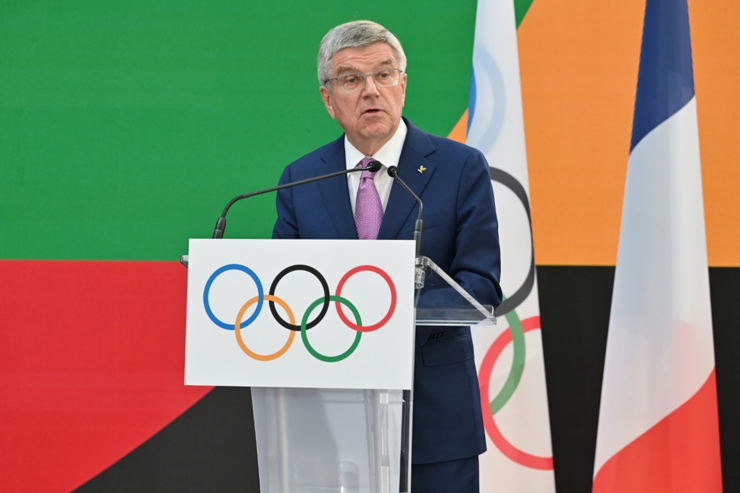
1) “Our world has changed in fundamental ways in recent years.”
2) “As we anticipated at the beginning of the COVID-19 crisis, we are now facing its far-reaching social, financial, economic and political consequences, which are exacerbated by the ongoing conflicts, wars and natural catastrophes that we must address.”
3) “Olympic Agenda 2020+5 is our roadmap to prepare ourselves for this new world, and we can be proud of the progress that has been made across all 15 recommendations since it was adopted in March 2021.”
4) “The accomplishments described in this Report are great examples of what we can achieve together, and are testament to the tremendous amount of work that has been carried out in partnership with our stakeholders.”
5) “There is still more to be done, but we can already look forward to the Olympic Games Paris 2024 as the Games of a new era, inspired by Olympic Agenda 2020 and Olympic Agenda 2020+5 from start to finish.”
13. Thomas Bach IOC President as Chair of IOC Refugee Foundation (14 December 2023)
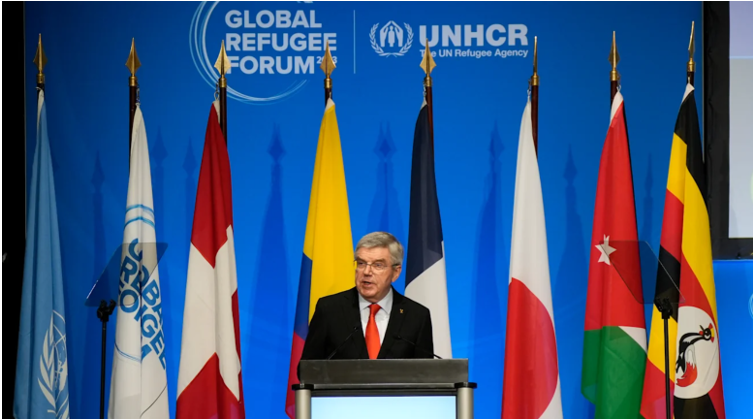
1) “Sport is about so much more than physical activity.
2) Sport is empowerment.
3) Sport is health.
4) Sport is inclusion.
5) Sport is respect.
6) Sport is solidarity.
7) Sport is belonging.
8) Sport is peace.
14. Thomas Bach IOC President’s Message of Condolences in Memory of the late Henry Kissinger (IOC Honor Member)
1) “When I was elected IOC President in 2013, I approached him and asked whether he would be ready to advise the IOC and me, as he had done through the IOC 2000 Commission. "
2) “He immediately said yes. Since then, we spoke regularly and became friends.”
3) “He gave me invaluable advice in all the many geopolitical issues the world and sport had to face in recent years.”
4) “I will greatly miss a brilliant man and a warm-hearted friend. My thoughts are with his beloved wife Nancy and all his family.”
*I would also like to pay my homage and personal respect to the late Henry Kissinger, the last IOC Honor member, who recently passed away. And I send my deepest sympathy and condolences to his bereaved family and the entire Olympic Movement. He kindly sent to me his message about my book publication as follows:
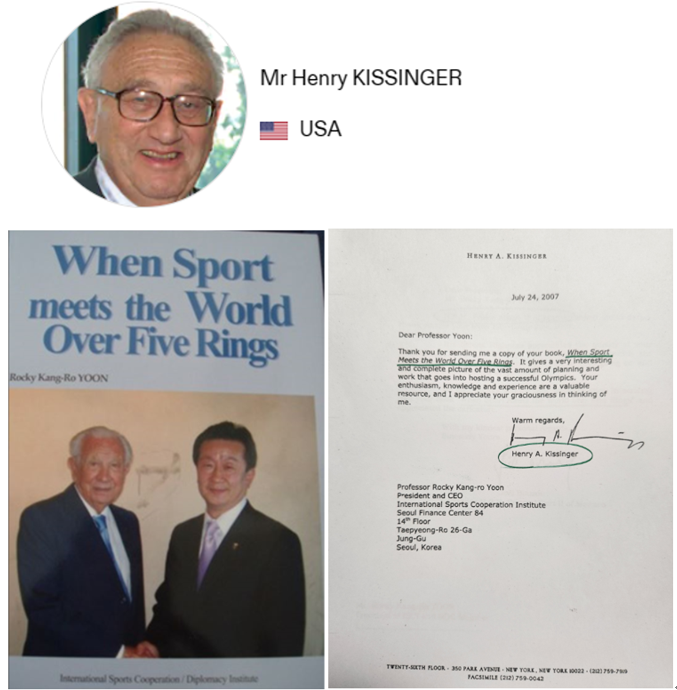
“Dear Professor Yoon,
Thank you for sending me a copy of your book, “When Sport meets the World Over Five Rings”
It gives me a very interesting and complete picture of the vast amount of planning and work that goes into hosting a successful Olympics.
Your enthusiasm, knowledge and experiences are a valuable resource and I appreciate your graciousness in thinking of me.
Warm regards,
Henry A. Kissinger”
15. IOC President Thomas Bach’s Brilliant Brain Child and a New Strategic Roadmap for the Future Olympic Movement, Olympic Agenda 2020+5 (Ref.: IOC website)
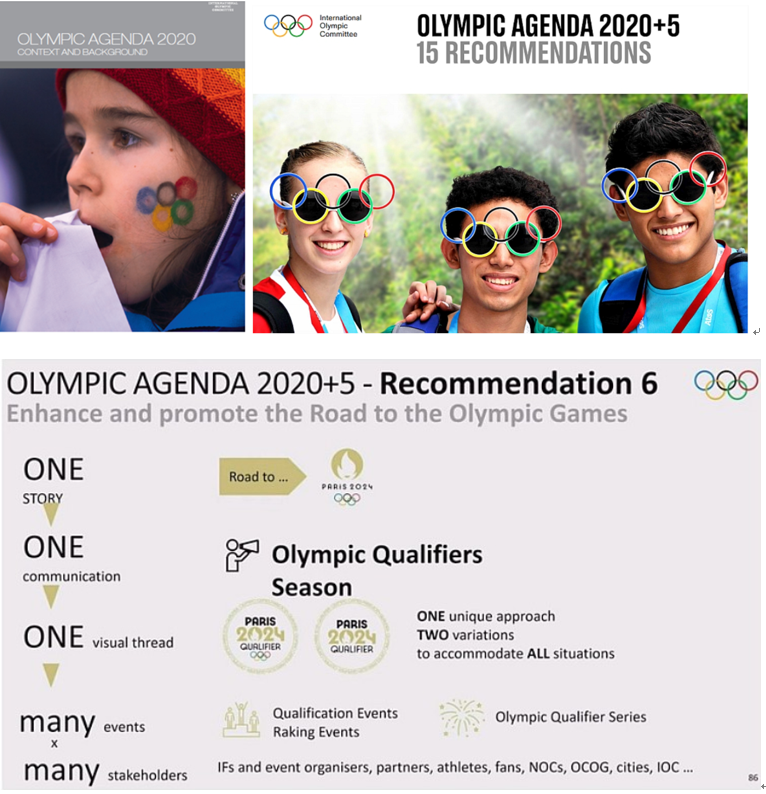

The 15 recommendations are based on key trends that have been identified as likely to be decisive in the post-coronavirus world. They are also areas where sport and the values of Olympism can play a key role in turning challenges into opportunities.
The key trends include:
1) The need for greater solidarity within and among societies;
*The growth in digitalization, while keeping in mind the need to expand digital capability to the currently digitally underserved;
-The urgency of achieving sustainable development;
-The growing demand for credibility, both of organizations and institutions; and
-The need to build resilience in the face of the financial and economic consequences that will result from the COVID-19 pandemic and which will influence priority-setting among governments and enterprises.
2) The 15 recommendations, which have been inspired by these trends, call upon the IOC and the Olympic Movement to:
(1) Strengthen the uniqueness and the universality of the Olympic Games
(2) Foster sustainable Olympic Games
(3) Reinforce athletes’ rights and responsibilities
(4) Continue to attract best athletes
(5) Further strengthen safe sport and the protection of clean athletes
(6) Enhance and promote the Road to the Olympic Games
(7) Coordinate the harmonization of the sports calendar
(8) Grow digital engagement with people
(9) Encourage the development of virtual sports and further engage with video gaming communities
(10) Strengthen the role of sport as an important enabler for the UN Sustainable Development Goals
(11) Strengthen the support to refugees and populations affected by displacement
(12) Reach out beyond the Olympic community
(13) Continue to lead by example in corporate citizenship
(14) Strengthen the Olympic Movement through good governance
(15) Innovate revenue generation models.
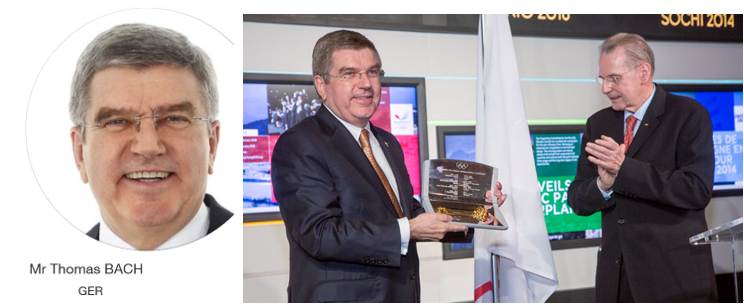
(A handover ceremony of the keys to the IOC)
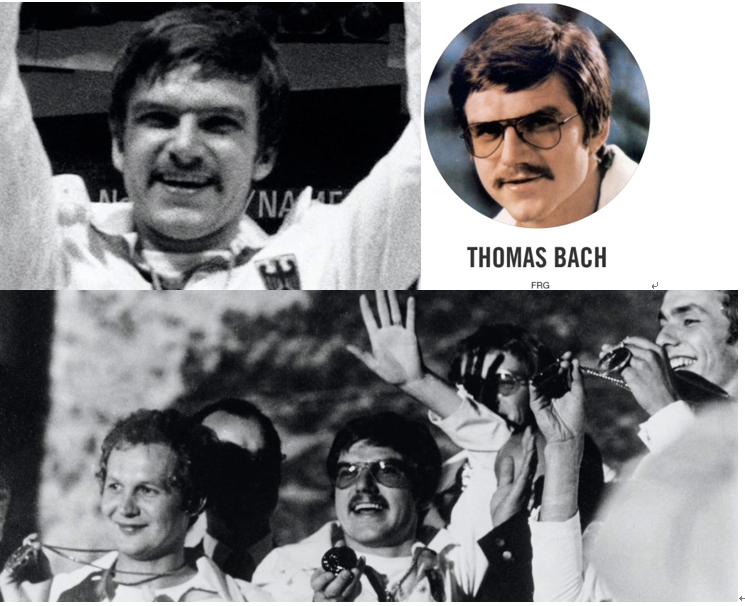
(Thomas Bach as an Olympic Champion Montreal 1976)
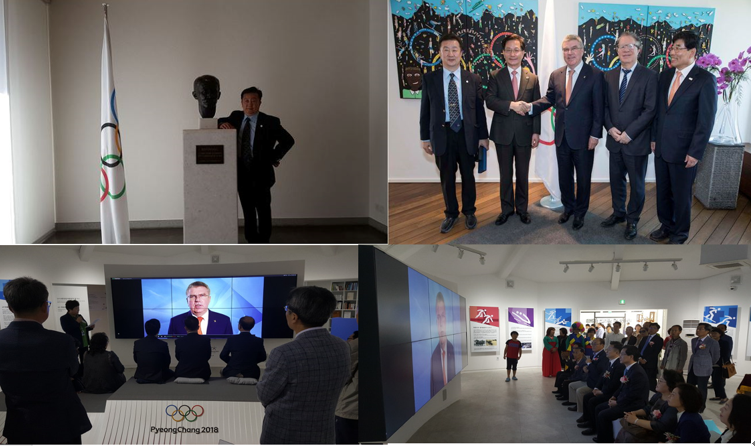
(Gangneung Olympic Museum)
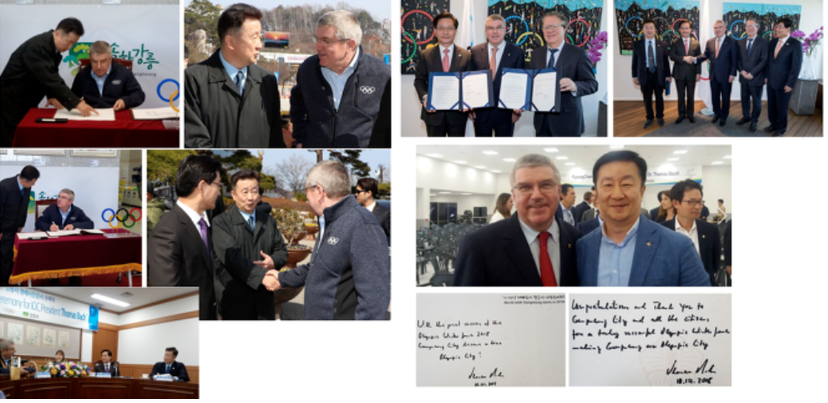
'스포츠 외교' 카테고리의 다른 글
| Gangwon 2024동계청소년올림픽과 IOC위원들과의 스포츠외교현장 (102) | 2024.01.23 |
|---|---|
| 폴란드신임체육장관, 폴란드의 2036년올림픽유치 주춤하다(Poland backtracks on 2036 Olympic bid)라고 언급하다 (96) | 2024.01.13 |
| Henry Kissinger IOC명예위원(IOC Honour Member)생전에 필자에게 보내온 자필서명감사서한과 그의 작고에 따른 Thomas Bach IOC위원장의 조의 표명 메시지 (38) | 2023.12.19 |
| 최신국제스포츠 외교 동향(12월15일 기준)요약 종합정리 (32) | 2023.12.18 |
| Thomas Bach IOC위원장의 재임 10년 차 십계명(Thomas Bach’s Ten Commandments)요약정리 (38) | 2023.12.15 |
